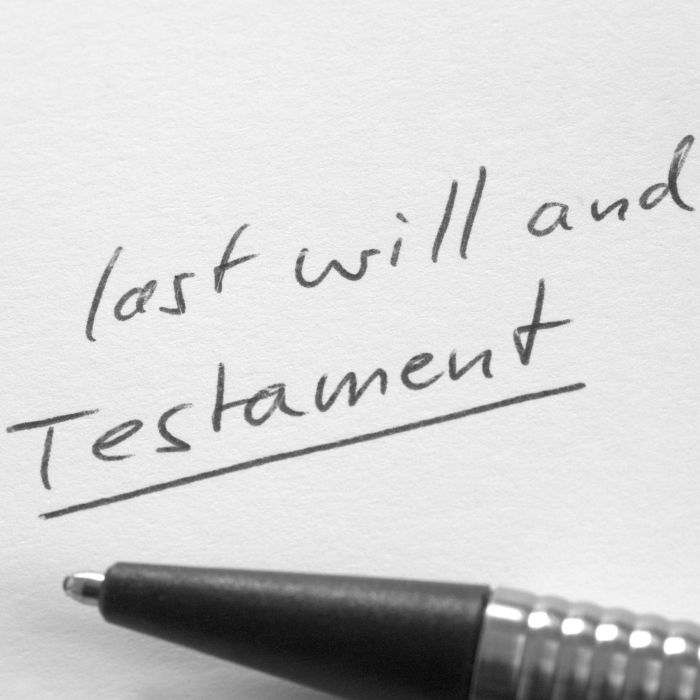Informal Wills
The Risks and Solutions of an Invalid Last Will and Testament
Informal Wills and Legacies
Your Last Will and Testament should clearly state how your estate is to be divided in the event of your passing — but be careful, Informal Wills may have no validity in practice.
Creating a Will is a powerful statement of your legacy. Not only are you proactively deciding how your lifetime’s monetary and asset successes are to be allocated — but you’re also providing treasured heirlooms, valuable memories, and financial assistance to your loved ones.
Yet, should you fail to make this document correctly — it could be considered Informal, meaning your wishes are ignored.
At Falzon Legal, we will considerately guide you through the process of writing a valid Will — ensuring that your intentions are followed exactly after you pass on.
What Is an Informal Will?
In NSW, for a Will to be considered valid and Formal, it needs to adhere to the strict requirements of Section 6 of the NSW Succession Act (2006).

This legislature states that for a Will to be considered Formal:
- The Will is in writing and is signed by the Testator (the Will maker).
- The Testator’s signature on the Will is made in the presence of at least two witnesses.
- The witnesses who saw the Testator sign the Will, also sign and attest the Will.
- The Testator signed the Will with the full intention of its contents being followed in the event of their death.
Generally speaking, any Will that doesn’t meet the above criteria is considered an Informal Will.
Examples of Informal Wills
An Informal Will is any document that was intended by the Will maker to declare how their estate should be divided in the event of their death — yet fails to meet the provisions mentioned above.
To make matters a little more complicated, the definition of a document has evolved.
Traditionally, as there were few other readily accessible formats, it was considered to be hand-written or typed. However, technological advances have now made a variety of forms available, which might be considered by the court as a document — although this is generally decided case-by-case.
This could be anything from a video recording or file on a hard drive, through to a text message or iPhone note.
Examples of an Informal Will are wide — however, they can include:
- A document that has just one witness signature, not the required two.
- A handwritten note on a hospital napkin made by a patient.
- An undated document.
- A diary entry.
- A bundle of cash in an envelope, with a short message saying who should receive it.
- A social media message sent from the Informal Will maker to a member of their family.
- A video recording that outlines how the assets should be divided.
The Risks of Creating an Informal Will
The truth is, no one sets out with a plan to make an Informal Will that might be considered invalid.
Some people are unaware that a Will has to adhere to strict guidelines. Others might feel uncomfortable speaking about their personal affairs with a legal professional — or consider that creating a Will themselves is a much more affordable option.
And it’s this increasingly popular trend of DIY Last Will and Testaments that creates the majority of Informal Wills.
Today, any quick online search will produce a multitude of providers promising a cheap, rapid, and legal Will — all you need to do is fill in the online boxes, and naturally, pay a fee.

The problem is, in many cases they aren’t valid — making them an Informal Will.
Often, it’s just an oversight, for example, failing to have the document witnessed. Other times, it’s a lack of legal knowledge, such as bequeathing assets that cannot be left to others, such as jointly-owned property or superannuation.
If these issues are identified prior to your passing, they can be resolved by consulting with a legal professional. However, most usually the problems are not uncovered until the Executor attempts — and fails — to achieve a Grant of Probate.
At Falzon Legal, as specialist Wills and Estates Lawyers, we can professionally advise, support, and guide you through making a valid Last Will and Testament.
An Informal Will May Mean Your Wishes Are Ignored — Speak to Falzon Legal NOW
Will Probate Be Granted With an Informal Will?
Probate is crucial — it’s a decree by the court that a Will is valid, and allows the Executor to proceed with the calling in and allocation of the deceased’s assets.
It’s this legal process where Informal Wills can fall down — although it is possible for the Court to decide that the Will, although not adhering to the regulations, can still be declared as valid.
The Succession Act NSW, Section 8, grants the Court the authority to override the demands of a Formal Will. It is up to the applicant for Probate — usually the Executor named in the Informal Will or its main beneficiary — to prove that the deceased considered the document to be their true wishes.

Following the precedent of Hatsatouris v Hatsatouris (2001), the Court decides the document is valid when:
- A document exists, which can reasonably be considered to detail how the deceased wanted their estate to be divided.
- The Court is satisfied that the creator of the document genuinely meant it to be their last Will and Testament.
When looking at the above, the Court considers each case on its individual merits.
Often, it will seek an answer to the question, did the recently deceased have a full awareness of the requirements to create a valid Will?
For example, if it can be shown the person who passed on knew that a Last Will and Testament needed to be signed and witnessed to be considered Formal — yet their Will lacks these crucial signatures — it might be a reasonable assumption that the deceased never planned on it being their final, and binding, wishes.
Furthermore, the Court may examine how the recently passed both handled and regarded the document. For example, did the deceased talk about it to family members, store it in a safe place, or treat it with respect? If not, it’s unlikely that the person considered it to be their final legacy.
While by no means exhaustive, the Court might also ask:
- Was the document stored in the same location as other valuable documents — such as a marriage or birth certificate?
- Has there been a long time gap between the creation of the document and the passing of the person?
- Can it be shown that the deceased knew about the document?
- Did the deceased make any declarations — orally or in writing — after the creation of the document that are at odds with its contents?
- Why did the recently passed person not make a Formal Will?
Probate can never, therefore, be assured or guaranteed — even if an informal Will exists. Only the Court can decide on its validity, and whether the deceased’s alleged final wishes can be followed.
Falzon Legal can ensure that your plans, hopes, and desires for your estate are adhered to. Diligently and considerately, we will work with you to build a reassuring, legal, and affordable Last Will and Testament.
Don’t Let the Court Decide on Your Will Validity — Speak to Falzon Legal NOW
When the Informal Will Is Declared Valid or Invalid — What Next?
Should the Court agree the Informal Will was intended by the deceased to detail how their estate should be divided — it will take precedence over all other Wills they had made. Probate will be granted, and any named Executors will then have the authority to divide the recently passed’s assets as outlined in the document. Or, if no Executors were stated in the Will, the Court will typically grant Letters of Administration to the applicant — permitting them to deal with the deceased’s estate.
Conversely, if an Informal Will isn’t declared by the Court to be valid, and there are no other Formal Wills in existence, the wishes expressed in the document cannot be followed.

Instead, the applicant will then have to apply for Letters of Administration — to gain authority to act as a proxy Executor — and divide the estate according to the rules of intestacy. Basically, allocating the deceased’s assets to the next of kin.
How Can Falzon Legal Help With Informal Wills?
Losing a loved one is, naturally, an emotionally painful, mentally challenging, and confusing time. The last thing on your mind will be the complex nuances of a validated Will.
But, it’s crucial you take legal advice.
Falzon Legal provides unmatched professional Wills and Inheritance counsel — with the human touch. If you have a document that you think is the deceased’s Last Will and Testament, speak to us.
Relentlessly supportive, we will considerately and patiently advise on your best course of action. In many cases, the document may — although not prepared by ourselves — meet the criteria of a Formal Will. Meaning, we can proceed directly with assisting you to apply for Probate.
Alternatively, where the document is apparently Informal in nature, we can advise on:
- Whether it’s in your best interests to validate the Informal Will.
- The cost/benefit trade-off by entering the Court process.
- The need — does validating the Will have the same outcome as following the rules of intestacy?
- Existence of any current inter-familial disputes.
- Volume and quality of evidence — is an application to validate the Will likely to succeed in Court?
Always acting in your best interests, Falzon Legal will compassionately guide you on your options if you have in your possession an Informal Will.
Falzon Legal — How To Avoid Making an Informal Will

Your Will is a powerful statement of your legacy — don’t allow it to be questioned or ignored after you pass.
While NSW law may, under strict circumstances, consider an Informal Will as your final wishes — it’s far from guaranteed. Not only are you running the risk of a Court deciding on how your assets are to be divided — but you’re also placing unnecessary stress and burdens on your loved ones, who will need to pursue legal action for validation.
Falzon Legal will guide you compassionately and affordably through creating a legally valid Last Will and Testament.
Meeting together face-to-face — at our office, your home, or your aged care facility — we can speak and discuss at a speed that’s most comfortable for you. Working as trusted partners, we will construct a heartfelt and considered legacy that isn’t open to court interpretation.
And, unlike many Inheritance Solicitors, there are no hourly charges.
Free from the pressure of clock-watching, you’re relaxed and able to talk about the subtleties and nuances of your genuinely individual and personal circumstances.
Informal Will FAQs
What Is an Informal Will NSW?
An Informal Will in NSW is a document alleged to declare the deceased’s wishes regarding the allocation of their estate — yet doesn’t meet the requirements outlined in the NSW Succession Act.
How Do You Prove an Informal Will?
The Informal Will needs to be validated in the Court — by proving that the document was intended by the deceased to be their final wishes regarding the division of their estate.
Will an Informal Will Get Probate?
The Court will only grant Probate if it can be satisfied that the document was intended by the deceased to be their Last Will and Testament.
What Makes a Will Invalid NSW?
If a Will isn’t signed by the Will maker, witnessed by two persons, or dated — it cannot be considered valid without court satisfaction.
Does a Will Need To Be Registered in Australia for It To Be Valid?
No. However, you should make family members and loved ones aware of where your Last Will and Testament is located — whether in a safe or lodged with your solicitor.
